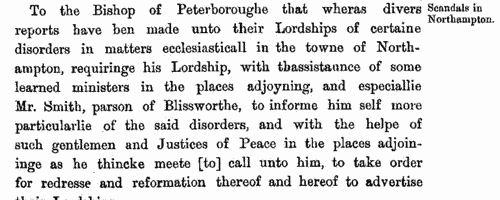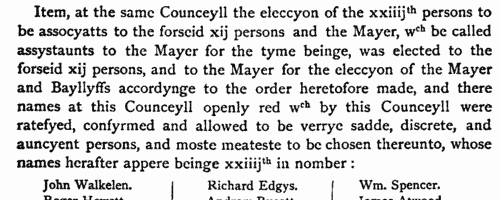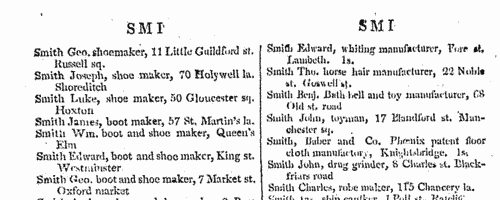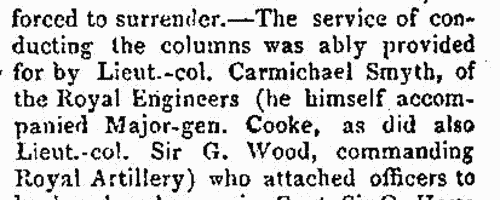Hewat Surname Ancestry ResultsOur indexes 1000-1999 include entries for the spelling 'hewat'. In the period you have requested, we have the following 72 records (displaying 1 to 10): Single Surname Subscription | | | Buying all 72 results of this search individually would cost £342.00. But you can have free access to all 72 records for a year, to view, to save and print, for £100. Save £242.00. More... |
These sample scans are from the original record. You will get scans of the full pages or articles where the surname you searched for has been found. Your web browser may prevent the sample windows from opening; in this case please change your browser settings to allow pop-up windows from this site. Liegemen and Traitors, Pirates and Spies
(1578-1580)
The Privy Council of queen Elizabeth was responsible for internal security in England and Wales, and dealt with all manner of special and urgent matters
HEWAT. Cost: £4.00.  | Sample scan, click to enlarge

| Citizens of Oxford
(1509-1583)
These selections from the Oxford city records were printed in 1880 under the direction of the Town Clerk. Much of the material comes from the council minutes: 24 common councillors were elected out of the citizens at large each 30 September. Apart from the general administration of the city, a large number of cases involve people brought before the Council for using improper language, or other misbehaviour. There is an almost unbroken series of hanasters, or admissions to freedom of the city, listing the names of those who by purchase, birth or apprenticeship were admitted to the guild merchant.HEWAT. Cost: £4.00.  | Sample scan, click to enlarge

| Scottish litigants, rebels and cautioners
(1585-1592)
The Privy Council of Scotland exercised a superior judicial authority in the kingdom, and consequently received and dealt with a constant stream of petitions, as well as dealing with the internal security of the state. This register of the council from 1 August 1585 to 31 July 1592, in the reign of king James VI, was edited by David Masson, and published under the direction of the Lord Clerk Register of Scotland in 1881. Some of the individuals mentioned are the complainants, those of whom they complained, and the sureties on both sides: at this period, some of the complainants are alleging serious attacks, often of a feuding nature. Many of the bonds entered into by the cautioners are promises to keep the peace towards such enemies. Failure to answer to the council when summoned was a serious contempt, leading to being denounced a rebel, with serious consequences. But 'horning' was also used in the pursuit of debts: there was no imprisonment for debt in Scotland, but a creditor could have an obstinate debtor ordered, in the sovereign's name, to pay what was due, failing which, the debtor could be put to the horn, denounced as a rebel, and imprisoned as a rebel. The main text (to page 774) is from the Acta Secreti Concilii, containing the minutes of the Privy Council, with intermixed Acta Proper (political edicts), Decreta (judicial decisions), Acta Cautionis (acts of caution) and Bands (registration of bonds). After that are printed some miscellaneous Privy Council documents from the same years: additional acts of caution (775-778); ordinances and acts anent the Borders and the North (779-814); and miscellaneous privy council papers (815-834). The sources most productive of names, the Acta Cautionis and Registration of Bands, are also the most repetitive in form, and are not transcribed verbatim and literatim: nevertheless, one of the editor's rules was for 'All proper names and names of places occurring in the originals to be preserved in the abstracts without exception, and in the exact original spelling.'
HEWAT. Cost: £4.00.  | Sample scan, click to enlarge

| Scottish litigants, rebels and cautioners
(1592-1599)
The Privy Council of Scotland exercised a superior judicial authority in the kingdom, and consequently received and dealt with a constant stream of petitions, as well as dealing with the internal security of the state. This register of the council from August 1592 to May 1599, in the reign of king James VI, was edited by David Masson and published under the direction of the Deputy Clerk Register of Scotland in 1882. The publication brings together the contents of the principal register (Acta Secreti Concilii) with acts and bands (bonds) of caution (surety) from the registers called Acta Cautionis (pp 561-730); Acts and Ordinances relating to the Borders and the North (731-748); and Miscellaneous Privy Council Papers (749-769). Many of the individuals mentioned are the complainants, those of whom they complained, and the sureties on both sides: at this period, many of the complainants are alleging serious attacks, often of a feuding nature. Many of the bonds entered into by the cautioners are promises to keep the peace towards such enemies. Failure to answer to the council when summoned was a serious contempt, leading to being denounced a rebel, with serious consequences.
HEWAT. Cost: £4.00.  | Sample scan, click to enlarge

| Merchants and traders in Aberdeen
(1399-1631)
A. M. Munro searched the council registers of the royal burgh of Aberdeen, and compiled this list of burgesses admited to the borough. The entries prior to 1591 were contained in lists engrossed in the council registers at the close of the minutes for the year ending at Michaelmas, but after that date in addition to the annual lists, which are continued, there is almost always a separate minute of admission under the respective dates. The records before 1591 are not only sparser, often with no more than a name, but are also lacking for 1401-1405, 1413-1432, 1434-1435, 1518-1519, 1557 and 1562-1564 - other blanks were filled in from the guildry accounts where such existed. Guild burgesses were allowed unfettered trading rights in Aberdeen; simple burgesses could only deal in Scottish wares (so being barred from the lucrative English and Flemish imports and exports); trade burgesses were limited to their own particular trades; and the council was able ex gratia to create honourary burgesses, who were accorded the full privileges of burgesses of guild and trade, and among whom numbered members of almost every family of note in Aberdeenshire. Burgesses could thus be created by descent, by apprenticeship into a trade, or ex gratia, and in the later portions of this roll the precise circumstances are usually given, sometimes also with the name of a cautioner or surety. Burgesses, masters and cautioners are all indexed here.HEWAT. Cost: £4.00.  | Sample scan, click to enlarge

| Soldiers, administrators, refugees and merchants in America
(1783)
These are the headquarters papers of sir Guy Carleton, British commander-in-chief at the end of the American war of independence. Many of the individuals recorded were part of the British military administration, but others are refugees and merchants whose lives had been disrupted by the conflict. These records cover April to December 1783.HEWAT. Cost: £4.00.  | Sample scan, click to enlarge

| Lincolnshire Cottagers: Croxton
(1801)
Robert Gourlay published the results of a detailed survey that he had made in person travelling from village to village in Lincolnshire and Rutland, examining the state of the cottagers in each parish. After a general description of the local agriculture, he listed the cottagers by name, and, where possible, recorded the acreage of their holdings, annual rent, the number of persons in each family, and their stock, giving numbers of cows, pigs, horses &c. HEWAT. Cost: £6.00.  | Sample scan, click to enlarge

| Traders and professionals in London
(1805)
Holden's Triennial Directory for 1805 to 1807 includes this 'London Alphabet of Businesses, Professions, &c.': coverage is good; about 30,000 individuals are recorded.HEWAT. Cost: £4.00.  | Sample scan, click to enlarge

| Deaths, Marriages, News and Promotions
(1814)
Death notices and obituaries, marriage and birth notices, civil and military promotions, clerical preferments and domestic occurrences, as reported in the Gentleman's Magazine. Mostly from England and Wales, but items from Ireland, Scotland and abroad.
HEWAT. Cost: £4.00.  | Sample scan, click to enlarge

| London Traders
(1814)
The fifteenth edition of The Post-Office Annual Directory includes this 'List of More than 17,000 Merchants, Traders, &c. of London, and Parts Adjacent', arranged alphabetically by surname, with trade in italics, and address.HEWAT. Cost: £4.00.  | Sample scan, click to enlarge

|
Research your ancestry, family history, genealogy and one-name study by direct access to original records and archives indexed by surname.
|












